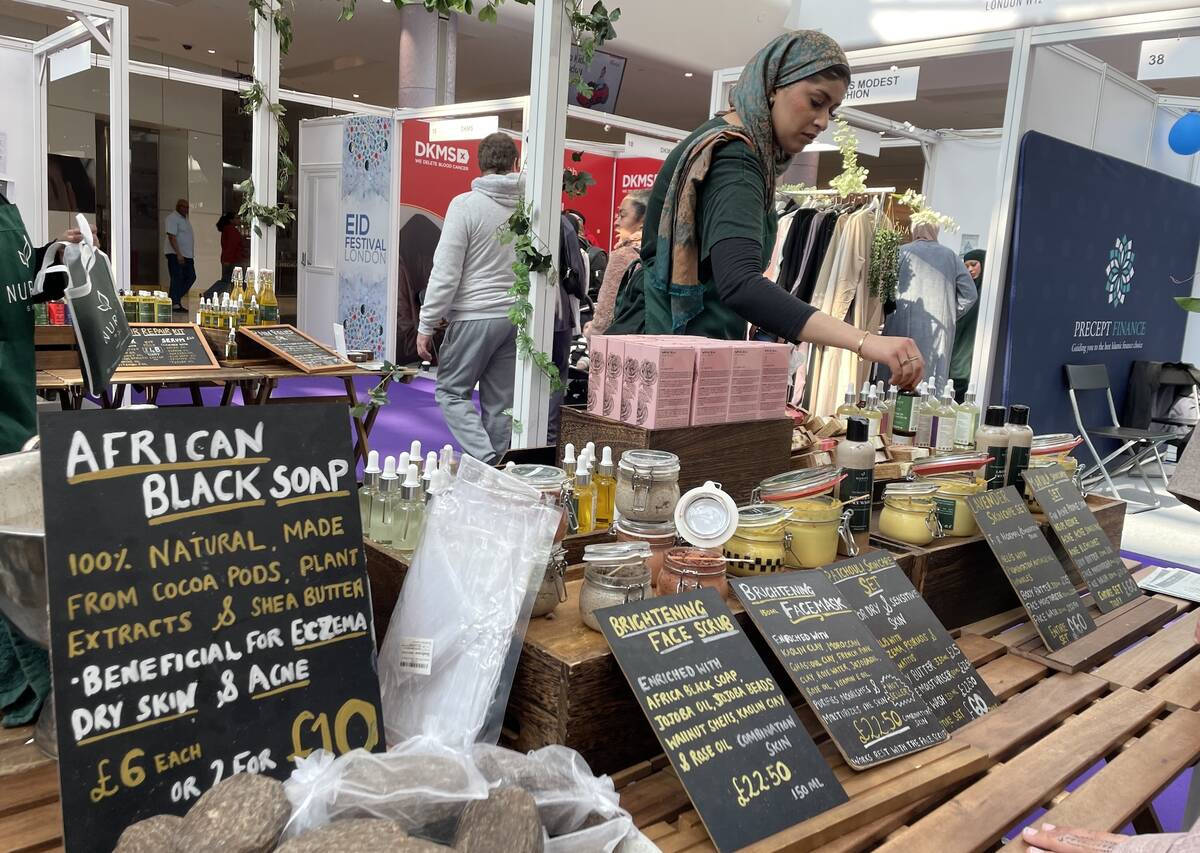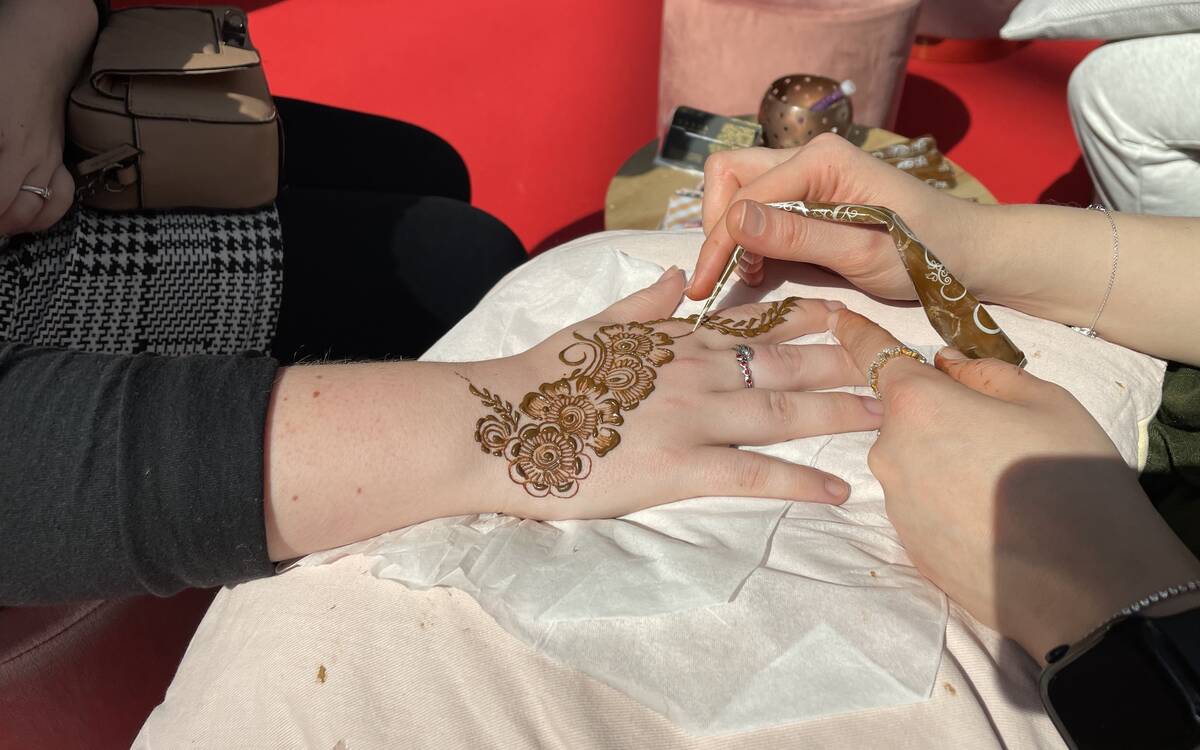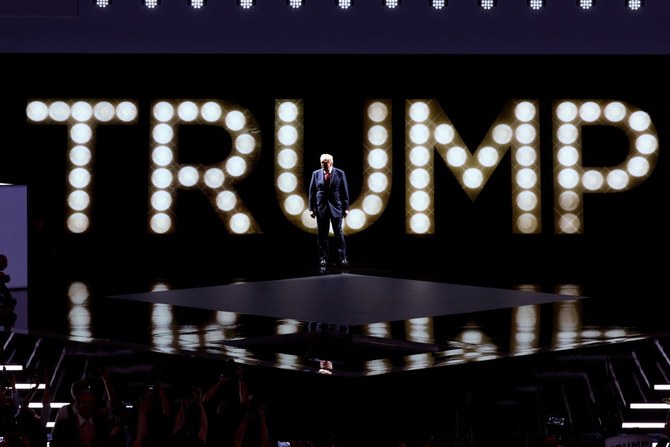MILWAUKEE: The Republican National Convention has culminated Thursday with former President Donald Trump 's acceptance of the party’s presidential nomination, achieving a comeback four years in the making and anticipated even more in the past week in light of Saturday’s assassination attempt.
Barack Obama has reportedly told allies that he believes Biden, his vice president for eight years, should “seriously consider the viability of his candidacy,” the Washington Post reported.
Several leading Democratic lawmakers have called on the 81-year-old president to drop out in the wake of his disastrous debate performance against Trump last month in which he appeared tired and confused.
Supporters have been lining up all week to applaud the former president for his bravery since Saturday’s assassination bid by a gunman at a Pennsylvania rally.
As some of his loyalists blamed Democrats’ rhetoric for the attack, Trump said he had torn up a more aggressive version of his keynote address in favor of one to “unite our country.”
Some of the delegates at the convention said they were keen to hear from Trump about last weekend’s shock attack that very nearly ended in disaster.
“I’m just grateful we’re going to hear from him,” Teena Horlacher, a 50-year-old convention delegate from Utah, told AFP. “It’s a miracle that his life was spared, and I really believe it was God’s hand.”
Trump has a 90-minute speaking slot, from 9:00 to 10:30 p.m. (0100 to 0230 GMT Friday), according to a source familiar with the schedule.
Also set to address the convention are shirt-ripping 80s wrestling icon Hulk Hogan, and Trump’s longtime friend Dana White who is chief executive of the Ultimate Fighting Championship.
Trump has attended multiple UFC bouts as he seeks to lock in younger male votes.
The schedule notably shows no speaking slot for former first lady Melania Trump, a break from tradition at modern-era US nominating conventions, where spouses routinely take the stage seeking to personalize the candidates.
Trump has seen his polling lead expand since Biden’s dismal debate performance threw his party into chaos.
The Republican campaign has even been talking up Trump’s chances in Democratic strongholds like Minnesota and Virginia, potentially forcing Biden funds and manpower away from defending his “blue wall” in Michigan, Pennsylvania and Wisconsin.
Trump’s keynote address will be watched by millions, closing the convention by promising what his team calls “a new golden age for America.”
The four-day gathering opened Monday with a vote to confirm Trump as the party’s nominee after he won almost every state’s primary contest.
It has been the first convention over which Trump has had total control, after a 2016 edition hampered by party divisions and a second appearance in 2020 reined in by the Covid-19 pandemic.
The schedule was designed around his image, with themes for each day playing on his “Make America Great Again” rallying cry.
Trump set the tone when he walked slowly into the Fiserv Forum arena on the opening day — looking emotional and with a bandaged ear, just two days after the shooting.
The week also saw Trump name right-wing Senator J.D. Vance of Ohio as his running mate.
The 39-year-old author of “Hillbilly Elegy,” a best-selling memoir about growing up poor in working-class America, is a former Trump critic who became one of his staunchest backers.
Trump himself was a diminished figure after his 2020 election loss and a subsequent riot at the US Capitol by his supporters, but he has spent much of the last four years reshaping Republican politics.
Installing close allies, including his daughter-in-law Lara Trump on the Republican National Committee, the mercurial tycoon has effectively crushed dissent within the party.
Trump accepts his GOP nomination on the convention’s final night
https://arab.news/jx4qq
Trump accepts his GOP nomination on the convention’s final night

- Trump has seen his polling lead expand since Biden’s dismal debate performance threw his party into chaos
Sahel alliance recalls ambassadors from Algeria after the downing of a Malian drone

- The Alliance of Sahel States, which includes Mali, said the drone downing was an “irresponsible act” that violated international law
- Algeria once served as a key mediator during more than a decade of conflict between Mali’s government and Tuareg rebels
DAKAR, Senegal: A military alliance between Mali, Burkina Faso and Niger withdrew their respective ambassadors from Algeria in response to the downing of a Malian drone this week, the group said late Sunday.
The Alliance of Sahel States, which goes by its French acronym AES, blamed Algeria on social media for the drone’s downing and condemned it as an “irresponsible act” that violated international law.
The act was “contrary to historical relations and fraternal relations between the peoples of the AES Confederation and the Algerian people,” the group said.
The Malian Foreign Ministry in a statement on social media Sunday denied claims by the Algerian government that the drone had violated Algeria’s airspace by over 2 kilometers (1.2 miles) and instead claimed that “this action proves, if proof were needed, that the Algerian regime sponsors international terrorism.”
Mali in the statement also summoned the Algerian ambassador, withdrew from a 15-year-old regional military group that includes fellow AES member Niger, and filed a complaint with “international bodies” about the incident.

The development comes as tensions are on the rise between Algeria and its southern neighbors, including Mali.
Rida Lyammouri, a Sahel expert at the Morocco-based Policy Center for the New South, said the latest war of words was unlikely to escalate beyond that. He doubted the Malian government’s ability to conduct a thorough investigation because the crash “took place in an area it doesn’t control, and what remains of the drone has been recovered by groups opposed to the government.”
Algeria once served as a key mediator during more than a decade of conflict between Mali’s government and Tuareg rebels. But the two countries have grown apart since a military junta staged coups in 2020 and 2021, putting military personnel in charge of Mali’s key institutions.
Algeria has denounced the direction that Mali’s new government has taken and its expanded efforts to quash rebellion in historically volatile parts of northern Mali. Afraid of the conflict spilling over the border, Algerian officials have denounced Mali’s use of Russian mercenaries and armed drones near Tin Zaouatine, a border town in the north were the drone was found.
Algeria has one of Africa’s largest militaries and has long considered itself a regional power but military leaders in neighboring Mali and Niger have distanced themselves as they’ve championed autonomy and sought new alliances, including with Russia.
Le Pen supporters rally in Paris, turning a protest into a populist show of force

- The National Rally, Le Pen’s party, organized the event in response to what it calls a politically motivated verdict
PARIS: Convicted of embezzling public funds and banned from running for office, far-right politician Marine Le Pen stood unshaken before a sea of French flags in Paris on Sunday. “For 30 years I have fought against injustice,” she told the crowd. “And I will continue to fight.”
Thousands of supporters gathered at Place Vauban, near the golden dome of Les Invalides and the tomb of Napoleon, for what was billed as a protest — but observers said it had all the markings of a campaign rally.
The National Rally, Le Pen’s party, organized the event in response to what it calls a politically motivated verdict. But with chants of “Marine Présidente!” and “They won’t steal 2027 from us,” the message was clear: this was more than a protest. It was a show of populist defiance aimed squarely at France’s institutions.
Bardella sharpens the attack
At the heart of that charge stood Jordan Bardella, Le Pen’s 29-year-old protégé and president of the National Rally. His speech was fiery, accusing France’s judges of trying to silence the opposition.
“March 29 was a dark day for France,” he said, referencing the date of Le Pen’s conviction. “The people must be free to choose their leaders — without interference from political judges.”
Though he claimed the party would respect democracy, Bardella denounced magistrates’ unions and warned of “a system determined to crush dissent.” Supporters carried signs reading “Justice taking orders” and “Stop the judicial dictatorship.” Others wore “Je suis Marine” (“I am Marine“) shirts or compared Le Pen to US President Donald Trump, who was convicted of civil fraud: “Trump can run — why not Marine?”
“The system’s not broken — it’s rigged,” said Alice Triquet, a 26-year-old bartender. “If they can do this to her, what stops them from coming after anyone who doesn’t think like them?”
One woman raised a handmade scale of justice, its arms bent and broken — a symbol of what Le Pen’s supporters see as a justice system turned against the people.
A nation divided over justice and power
Le Pen was found guilty of using European Parliament funds to pay party staff in France — a scheme the court described as “a democratic bypass.” She was sentenced to four years in prison, including two under house arrest and two suspended, and banned from public office for five years, effective immediately. Her appeal is expected next year.
The reaction has been sharply divided. While National Rally supporters denounce the ruling as politically motivated, many outside the party see it as legitimate accountability. “I challenge the notion that there is a tsunami of support for Le Pen on this issue,” said John Goodman, Ph.D., director of Syracuse University’s flagship program in France.
He also criticized the unusually rapid pace of Le Pen’s appeal. “Her appeal has been fast-tracked so it can be heard in the summer of 2026, well before the 2027 presidential election, and significantly faster than a typical criminal case,” Goodman said.
Warnings of a ‘Trumpist turn’
On the other side of the Seine, hundreds gathered for a counter-rally led by left-wing parties, warning that France’s far right is embracing US-style authoritarianism.
“This is bigger than Marine Le Pen,” said Green Party leader Marine Tondelier. “It’s about defending the rule of law from people who think justice is optional.”
Placards read “No Trumpism in France” and “Anti-fascist response.” Meanwhile, former Prime Minister Gabriel Attal addressed supporters at a meeting of the center-right Renaissance party in the Paris suburb of Saint-Denis, calling the moment “a test of the Republic.” Former PM Edouard Philippe stood by his side.
Though police were out in force, only minor clashes were reported.
The real message: trust the people, not the courts
Beyond the legal battle, Sunday’s gathering of the National Rally revealed a deeper strategy. Party leaders have spent the week accusing judges of plotting a “judicial coup.” They’ve called the sentence a political “execution.” The goal is not just to overturn the ruling — it’s to convince voters the legal system itself can’t be trusted.
It’s a page from the Trump playbook: paint the courts as biased, the system as broken, and frame any legal setback as an attack on democracy. The ballot box becomes the only authority that matters.
“The judges wear robes, but they’re just politicians in disguise,” said Claude Morel, 68, a pensioner from the southern city of Marseille. “Let the people decide.”
What comes next
Le Pen may be barred from running — for now — but her political machine is far from finished. Bardella, long seen as her polished understudy, is stepping into the spotlight with growing confidence and sharpened rhetoric.
“We will be here tomorrow,” he told the crowd. “And we will be stronger.”
Sunday’s rally was more than a show of strength. It was a test: can the far right convince enough French voters that justice is no longer neutral, and that only they can return power to the people?
How that question is answered may shape not only the 2027 presidential race — but the future of French democracy.
Aid cuts could leave more women dying in pregnancy and birth, UN says

- “One of the headline messages is that the funding cuts risk not only that progress, but we could have a shift backward,” said Dr. Bruce Aylward, Assistant Director-General, Universal Health Coverage at the WHO
LONDON: Cuts to aid budgets are threatening to undermine years of progress in reducing the number of women dying during pregnancy and childbirth, and could lead to a rise in deaths, the United Nations has warned.
Globally, there was a 40 percent decline in maternal deaths between 2000 and 2023, a report by UN agencies including the World Health Organization (WHO) showed on Monday, largely due to better access to essential health services.
That could now go into reverse, the WHO said in a statement accompanying the report which did not mention specific cuts but came in the wake of a foreign aid freeze by the US government and the ending of funding through the United States Agency for International Development (USAID) for many programs.
Other donor countries including Britain have also announced plans to cut aid budgets.
“One of the headline messages is that the funding cuts risk not only that progress, but we could have a shift backward,” said Dr. Bruce Aylward, Assistant Director-General, Universal Health Coverage at the WHO.
The cuts have had “pandemic-like effects” on health systems globally and could have a “more structural, deep-seated effect,” Aylward added.
The WHO said the cuts were already rolling back vital services for maternal, newborn and child health in many countries, reducing staff numbers, closing facilities and disrupting supply chains for supplies including treatments for hemorrhage and pre-eclampsia.
Cuts to other areas, such as malaria and HIV treatment, would also impact maternal survival, the UN said.
Even before the aid cuts led by the United States, things were backsliding in some countries, and progress has slowed globally since 2016, the report said.
In 2023, despite recent progress, a woman still died roughly every two minutes — around 260,000 in total that year — from complications that were mainly preventable and treatable, it added.
The situation was particularly bad in countries affected by conflict or natural disaster, although the US itself is one of only four countries to have seen its maternal mortality rate increase significantly since 2000, alongside Venezuela, the Dominican Republic and Jamaica.
The COVID-19 pandemic also had an impact, the report said: 40,000 more women died due to pregnancy or childbirth in 2021, bringing the total number of deaths that year to 322,000.
“While this report shows glimmers of hope, the data also highlights how dangerous pregnancy still is in much of the world today – despite the fact that solutions exist,” WHO Director-General Tedros Adhanom Ghebreyesus said.
The report itself was part-funded by USAID.
Zelensky slams US lack of response to Putin truce rejection

- Zelensky said “the number of Russian air attacks is increasing,” which he said proved that “the pressure on Russia is still insufficient”
KYIV, Ukraine: Ukraine’s President Volodymyr Zelensky on Sunday lamented the lack of a US response to Russia’s refusal to agree “a full, unconditional ceasefire” as two people were killed in Moscow’s latest aerial bombardment.
Russia mounted a “massive” missile and drone attack on Ukraine that also wounded seven people, Zelensky said, warning that Moscow was stepping up its aerial attacks.
Ukraine has agreed to an unconditional truce in the more than three-year-long war proposed by the United States but Russian President Vladimir Putin has refused to do so.
“We are waiting for the United States to respond — so far there has been no response,” said Zelensky.
Russia claimed the capture of a village in Ukraine’s Sumy region in a rare cross-border advance, but Ukraine branded that as “disinformation.”
Earlier, Russia “launched a massive nationwide attack on Ukraine using ballistic missiles, cruise missiles and drones,” said Ukraine’s first deputy prime minister Yulia Svyrydenko.
Zelensky said “the number of Russian air attacks is increasing,” which he said proved that “the pressure on Russia is still insufficient.”
In Kyiv, explosions were heard in the night and a smoke rose up from the city on Sunday morning.
One person was killed and three people were wounded, the head of the city’s military administration, Tymur Tkachenko, wrote on social media.
Kyiv mayor Vitali Klitschko said that “the body of a man killed in an enemy attack was discovered in Darnytsia district.”
A missile strike partially destroyed a building housing state foreign-language broadcasters, the Russian-language Freedom television channel reported, saying that its newsroom had been destroyed.
Emergency services said that fires broke out in non-residential buildings in Kyiv. In a nearby region, a man was burned when an attack sparked a house fire, the head of the military administration said.
Russia attacked Ukraine with 23 cruise and ballistic missiles and 109 drones during the night, the Ukrainian air force said.
The air force said it shot down 13 of the missiles and 40 drones while 54 others caused no damage.
In the southern Kherson region, a drone killed a 59-year-old man, while in the northeastern Kharkiv region, near the border with Russia, two people were wounded in an aerial bomb attack, regional officials said.
In the western region of Khmelnytsky, authorities said air defenses destroyed a missile but falling fragments damaged a house and wounded a woman.
Over the past week, Russia has launched more than 1,460 guided aerial bombs, nearly 670 attack drones, and over 30 missiles of various types on Ukraine, Zelensky said.
Russia’s defense ministry said troops “liberated” the village of Basivka, close to the border with Russia’s Kursk region. Ukraine quickly rejected the report.
“The enemy continues its disinformation campaign regarding the seizure of settlements in Sumy region or the breakthrough of the border,” Andriy Demchenko, spokesman for the State Border Guard Service of Ukraine, told AFP.
French President Emmanuel Macron echoed Zelensky’s calls for a stronger response to Russia.
“A ceasefire is needed as soon as possible. And strong action if Russia continues to try to buy time and refuse peace,” Macron said on X on Sunday.
Russia continues “to murder children and civilians,” he added.
The latest attacks came two days after a missile attack on the central Ukrainian city of Kryvyi Rig killed 18 people including nine children.
The United Nations High Commissioner for Human Rights, Volker Turk, denounced Russia’s “reckless disregard” for human life in using “an explosive weapon with wide area effects.”
Russia on Sunday said it had struck a central artillery base and enterprises involved in producing drones.
It accused Ukraine of striking its energy infrastructure including a gas distribution facility in the Voronezh region.
US President Donald Trump is pushing the two sides to agree a partial ceasefire, but has so far failed to broker an accord acceptable to both sides.
The United States is also seeking better ties with Russia and Kremlin envoy Kirill Dmitriev in an interview with state television said that the next US-Russian contacts could be “next week,” Russian news agencies reported.
Dmitriev last week became the most senior Russian official to visit Washington since Moscow’s invasion of Ukraine.
Westfield London’s Eid Festival celebrates British Muslims’ impact on communities

- Event features nearly 100 vendors selling jewelry, fragrances, books, clothes, sweets
- Shopping mall hosts event for sixth successive year
LONDON: Eid Al-Fitr celebrations began in London this weekend and featured numerous events, the most notable happening at Westfield London, Europe’s largest shopping mall.
Although Eid was celebrated at the end of March in most Muslim countries to signify the end of the fasting month of Ramadan, some planning is required in Europe and the UK to mark the occasion at weekends.
Eid fell this time on the first weekend of beautiful spring days, warm and sunny, although there was a chilly breeze in the shade. It coincided with the Easter school holiday, the clocks have already moved forward, and the cherry blossoms are blooming.
The London Eid Festival at Westfield London has been celebrated for six successive years, and next weekend, from April 11 to 13, it takes place for a second year at Westfield Stratford City in East London.

Westfield London is an enormous upmarket shopping destination featuring more than 460 stores. For those accustomed to shopping at local delis and occasionally making trips to Sainsbury’s, the interactive touch-screen map at Westfield is essential for navigating the seven levels of the mall.
The London Eid Festival features independent vendors selling jewelry, fragrances, books, clothes, and sweets near the front of the mall. Just outside Wood Lane Station, two rows of food stalls featuring halal cuisine from China to Mexico are ready for celebrators to enjoy meals under the sun. Families with children in prams, teenagers on Easter break, and those curious about Eid sit on colorful yellow and blue benches to listen to singing performances and watch children’s ballet in the yard.
Westfield is a mainstream location for all communities, and this gives us an opportunity to showcase the Muslim community to the rest of the world
Waleed Jahangir, Algebra Consulting
Organizers are expecting more than 300,000 visitors at both weekends of the Eid celebrations at Westfield London and Westfield Stratford City.
Waleed Jahangir, the managing director at Algebra Consulting, told Arab News that the celebration taking place in one of the world’s leading public venues is what makes the London Eid Festival unique.
“Westfield is a mainstream location for all communities and this gives us an opportunity to showcase the Muslim community to the rest of the world,” Jahangir said.
“When you hire a venue, the doors are closed with a majority of Muslims there; but here I want to showcase the power, the impact, and the festivities to the mainstream audience and in front of all the major brands … which benefit from the footfall and the sales.”

Most vendors at the London Eid Festival are independent businesses with a once-a-year opportunity to sell and showcase their products alongside Westfield’s major chains and big brands such as Apple, Nike, H&M, and Zara.
However, some of their products are pretty niche, such as Ghanaian African black soap made from cocoa pods. It appeared too adventurous for someone who grew up in Jerusalem using olive oil soap before discovering Mitchell’s wool fat soap on a drizzly day at Chatsworth House.
But the most popular item to buy at the festival was Dubai chocolate, according to the young food enthusiasts
Lubna, the vendor, acknowledges that Ghanaian black soap is not their best seller but the pain relief oil, which has been sold for the past nine years, is popular among customers for treating arthritis and joint pain.
Hanzalla, one of nearly 100 vendors at the London Eid Festival, sees the event as an excellent opportunity to showcase his halal food supplements, which are produced and packaged without alcohol or pig products.

Some vendors do not have physical stores but operate online, such as Learning Roots, a publisher that offers children’s books about the prophets and illustrated translations of the Qur’an.
Thobes for women, Palestine T-shirts, and oud essential oil are available for Eid celebrators.
However, I saved my cash for a halal Chinese meal of chicken, green beans, and noodles with chilli flakes. According to Ali and Mohammed, who are from Indonesia, this is the most popular meal.
There were three Korean food stalls, one of them selling German halal sausages. I asked Wahy, as he was preparing to open for customers at noon, about the popularity of Korean cuisine in the market, but he could not find a convincing reason other than “English people like it.”

But the most popular item to buy at the festival was Dubai chocolate, according to the young food enthusiasts who spoke to Arab News. Shayaan was visiting with his father Taleb and explained that it became famous after going viral on TikTok. It is his favorite thing.
Dubai chocolate is made with shredded phyllo dough and pistachio cream, the vendor explained as she served customers. She noticed it had become a bestseller over the last year or so.
Shayaan was clearly enjoying his Eid and the Dubai chocolate. Those who grew up in the 1990s in the Middle East remember how we eagerly waited for Eid to spend our money on Kinder Surprise to get our hands on the tiny toys; nowadays it is Dubai chocolate, and for good reason.






















